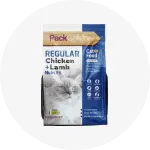Signs of Congestive Heart Failure in Dogs – What Every Pet Parent Should Know
Our dogs are more than pets—they are family. Just like humans, dogs can suffer from heart conditions, and one of the most serious is Congestive Heart Failure (CHF). Understanding the early signs of congestive heart failure in dogs can make all the difference in getting timely treatment and improving your dog’s quality of life.
This guide will help you recognize symptoms, understand causes, and explore care options so you can give your furry friend the best chance at a healthy, happy life.
🐶 What is Congestive Heart Failure in Dogs?
Congestive Heart Failure (CHF) occurs when your dog’s heart cannot pump blood effectively, leading to fluid buildup in the lungs, abdomen, or other organs. This makes breathing and circulation difficult, eventually impacting the dog’s overall health and energy levels.
CHF is not a sudden condition—it develops over time. Catching it early can make treatment much more effective.
⚠️ Early Signs of Congestive Heart Failure in Dogs
1. Persistent Coughing
If your dog coughs frequently, especially at night or after exercise, it may be a sign of fluid accumulation in the lungs due to heart failure.
2. Difficulty Breathing
Labored or rapid breathing, panting excessively without exercise, or struggling to catch breath can indicate CHF.
3. Fatigue & Weakness
Dogs with heart problems tire easily. If your dog suddenly refuses to play, take long walks, or gets exhausted after mild activity, it could be a warning sign.
4. Loss of Appetite & Weight Changes
Heart failure often reduces appetite. Some dogs lose weight (muscle loss), while others gain weight due to fluid retention.
5. Fainting or Collapsing
In severe cases, your dog may collapse during activity because the heart can’t supply enough blood to the brain.
6. Swollen Belly (Ascites)
A swollen abdomen may indicate fluid buildup, a classic sign of right-sided CHF.
7. Restlessness While Sleeping
Dogs with CHF may frequently change positions at night, unable to find a comfortable posture due to breathing difficulties.
8. Pale or Bluish Gums
Poor circulation causes gums and tongue to appear pale or bluish instead of healthy pink.
👉 If you notice one or more of these signs, consult a vet immediately. Early detection = better treatment outcomes.
🐾 Causes of Congestive Heart Failure in Dogs
-
Genetics & Breed Risks: Breeds like Labrador Retrievers, Boxers, Dobermans, and Cavalier King Charles Spaniels are more prone to CHF.
-
Heart Valve Disease: One of the most common causes in small and medium breeds.
-
Dilated Cardiomyopathy (DCM): Affects large breeds, weakening the heart muscle.
-
High Blood Pressure & Obesity: Can strain the heart.
-
Infections or Heartworms: Parasites can severely damage the heart.
🏥 Diagnosis & Treatment Options
✅ Diagnosis:
Vets use physical exams, X-rays, ECG, blood tests, and ultrasounds to confirm CHF.
✅ Treatment:
While CHF has no permanent cure, it can be managed with:
-
Medications: Diuretics (to reduce fluid), ACE inhibitors (to relax blood vessels), and other heart medications.
-
Dietary Management: Low-sodium diets to prevent fluid buildup.
-
Supplements: Omega-3 fatty acids, taurine, and L-carnitine may help support heart health.
-
Lifestyle Changes: Controlled exercise, weight management, and stress reduction.
👉 With proper care, dogs with CHF can live comfortably for years.
🐕 Prevention & Care Tips for Dog Heart Health
-
Feed a balanced, heart-healthy diet
-
Maintain your dog’s ideal weight
-
Ensure regular exercise (avoid overexertion)
-
Schedule routine vet checkups
-
Use heartworm preventives
-
Provide supplements for canine heart health
✅ Final Thoughts
Recognizing the signs of congestive heart failure in dogs early can save your dog’s life. Persistent coughing, difficulty breathing, fatigue, or loss of appetite should never be ignored. While CHF cannot be fully cured, it can be managed with the right diet, supplements, medications, and lifestyle care.
At Pet Canin, we provide a range of dog health supplements, nutritious food, and pet care essentials to help your furry friend live a longer, healthier, and happier life.




















